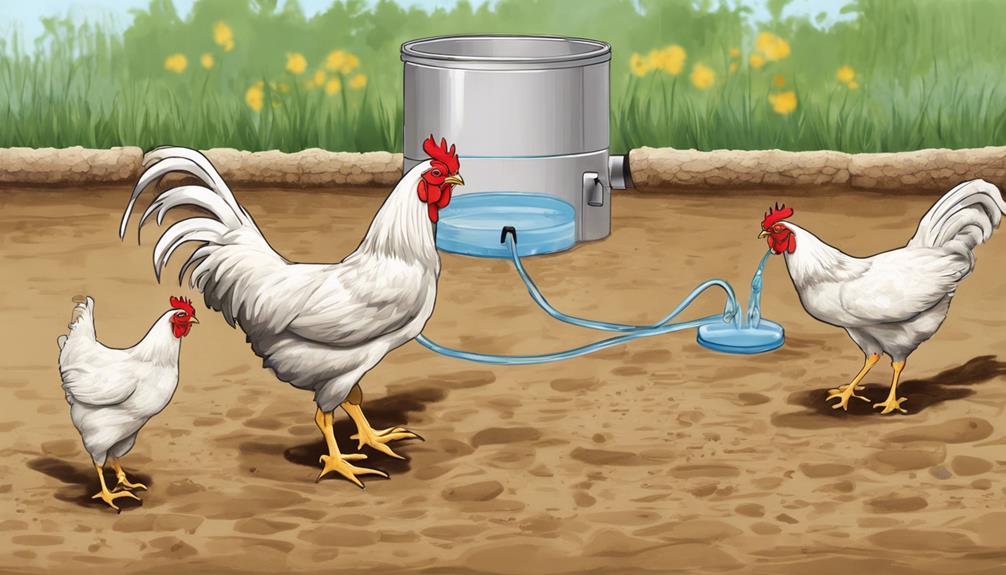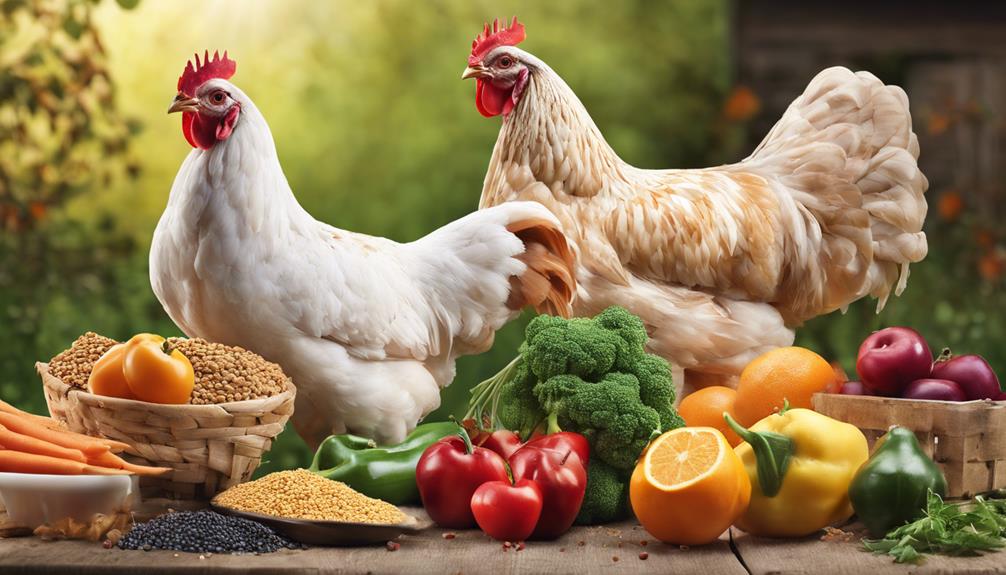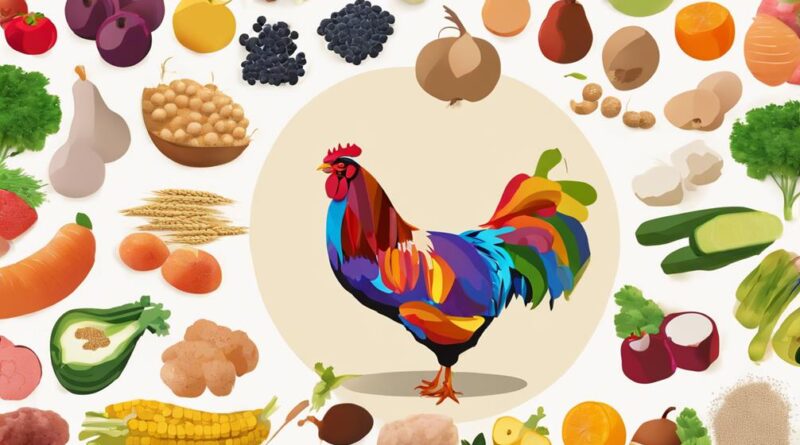Top 10 Nutritional Needs of Laying Hens"
You know the importance of providing your laying hens with a well-rounded diet that meets their nutritional needs. Ensuring they receive adequate levels of protein, essential amino acids, calcium, and other key nutrients is crucial for their health and productivity. But, have you ever considered the specific details of the top 10 nutritional requirements they must have to thrive? Stay tuned to discover the essential elements that make up the foundation of a balanced diet for your laying hens.
Protein Requirements
When considering the protein requirements of laying hens, it's crucial to understand the specific needs of these birds for optimal health and egg production. Proteins are essential for the growth, maintenance, and development of tissues in laying hens. The amino acid balance within the protein sources is of utmost importance as it directly impacts the birds' ability to lay eggs consistently.
Amino acids are the building blocks of proteins, and laying hens require a precise balance of these to support their egg-laying capabilities. Essential amino acids like methionine, lysine, and cysteine play a critical role in egg production. Ensuring that the feed sources provided to laying hens contain the right levels of these essential amino acids is vital for their overall health and productivity.
Protein sources such as soybean meal, fish meal, and canola meal are commonly used in commercial poultry feeds to meet the protein requirements of laying hens. These feed sources are carefully formulated to provide the necessary amino acids required for optimal egg production. It's important to select high-quality feed sources that contain the correct balance of amino acids to support the hens' needs.
Calcium Intake
To support optimal eggshell formation and overall health, laying hens require a carefully managed intake of calcium in their diet. Calcium plays a crucial role in ensuring shell strength and egg quality. Laying hens need a consistent supply of calcium to form strong eggshells and prevent issues such as thin or cracked shells.
One way to provide calcium to laying hens is through oyster shells. Oyster shells are an excellent source of calcium and are commonly offered to hens free-choice. This allows the hens to consume calcium as needed, especially when they're actively laying eggs. Another method is through feed supplements specifically formulated for laying hens. These supplements are designed to provide the necessary nutrients, including calcium, in the right proportions to support egg production and overall health.
It is essential to monitor the calcium intake of laying hens to prevent calcium deficiencies or excess, which can lead to health problems. Calcium levels in the diet should be carefully balanced to meet the hens' needs during different stages of egg production. By ensuring the hens receive adequate calcium, you can promote strong eggshells, improve egg quality, and support the overall well-being of your flock.
Phosphorus Levels
Maintaining appropriate phosphorus levels in laying hens' diets is crucial for supporting bone health and egg production efficiency. Phosphorus plays a vital role in the formation of the skeletal structure and the development of eggshells. To ensure optimal phosphorus absorption, it's essential to provide a balanced diet that includes adequate dietary phosphorus sources.
Dietary phosphorus sources for laying hens can include both plant and animal-based ingredients. Some common plant-based sources of phosphorus include soybean meal, corn, and wheat. Animal-based sources can include fish meal and bone meal. It's important to note that the availability of phosphorus in plant-based sources may vary depending on factors such as processing and anti-nutritional factors present in the feed.
When formulating the diet for laying hens, it's crucial to consider the phosphorus to calcium ratio. An imbalance in this ratio can lead to poor phosphorus absorption and various health issues in hens, including decreased egg production and weakened bones. The ideal ratio of calcium to phosphorus in the diet for laying hens is around 2:1.
Vitamin D Needs
What role does Vitamin D play in the nutritional needs of laying hens to support their overall health and egg production efficiency?
Vitamin D is crucial for laying hens as it plays a vital role in maintaining bone health and supporting optimal egg production. Laying hens require Vitamin D to effectively absorb calcium and phosphorus, essential minerals for strong eggshells and overall skeletal structure.
Sunlight exposure is a primary natural source of Vitamin D for laying hens. When hens are exposed to sunlight, a process in their skin produces Vitamin D3, which is then converted into its active form in the liver and kidneys. However, depending solely on sunlight may not always suffice, especially in regions with limited sunlight or during certain seasons. In such cases, Vitamin D supplementation in the form of feed additives becomes necessary to meet the hens' requirements.
Ensuring adequate Vitamin D levels in laying hens is crucial for their bone health. Vitamin D helps regulate calcium and phosphorus levels in the blood, preventing disorders like osteoporosis and weak eggshells. Moreover, Vitamin D influences the hens' reproductive performance by supporting the development of strong eggshells and promoting overall egg production efficiency.
Essential Fatty Acids
Essential fatty acids are vital components in the diet of laying hens to support various physiological functions essential for optimal health and egg production efficiency. Ensuring the right balance of omega-3 and omega-6 fatty acids is crucial for maintaining the overall well-being of your hens and the quality of the eggs they produce. Here are five key points to consider:
- Omega-3 Sources: Incorporating sources rich in omega-3 such as flaxseed, chia seeds, or fish oil into your hens' diet can enhance the omega-3 content in their eggs, providing potential health benefits for consumers.
- Supplementation: If natural sources of omega-3 are limited, consider supplementing your hens' feed with omega-3 fatty acids to ensure they receive an adequate amount in their diet.
- Egg Quality: Omega-3 fatty acids are known to improve egg quality by enhancing the yolk color, increasing the shelf life of eggs, and potentially reducing the risk of certain diseases in hens.
- Omega-6 Balance: While omega-6 fatty acids are also essential, an imbalance between omega-3 and omega-6 fatty acids can lead to health issues. Monitoring and adjusting the ratio of these fatty acids in the diet is crucial for optimal hen health.
Trace Mineral Necessities
Are trace minerals crucial for the optimal health and egg production efficiency of laying hens? Absolutely. Trace minerals play a vital role in the overall well-being and productivity of laying hens. Mineral supplements are essential to ensure that hens receive an adequate supply of trace minerals such as zinc, copper, selenium, manganese, and iron in their diet. These minerals are involved in various physiological processes, including enzyme activation, bone formation, and immune function.
To meet the trace mineral requirements of laying hens, it's important to consider the quality of the feed. The feed quality directly impacts the availability and absorption of trace minerals by the hens. Poor-quality feed may lack sufficient levels of essential minerals, leading to deficiencies that can negatively affect egg production and overall hen health. Therefore, it's recommended to provide a balanced diet that includes high-quality feed with adequate levels of trace minerals or to offer mineral supplements as needed.
Ensuring that laying hens receive the necessary trace minerals through mineral supplements or high-quality feed is crucial for maintaining their health and maximizing egg production efficiency. By meeting their trace mineral requirements, you can help support the hens' overall well-being and promote optimal performance in egg production.
Water Consumption

Ensuring adequate water consumption is crucial for the health and productivity of laying hens. Water plays a vital role in various physiological processes, directly impacting egg production and overall flock health.
- Hydration Benefits:
Adequate water intake is essential for maintaining proper hydration levels in laying hens. Hydration impacts egg formation, shell quality, and overall egg production rates.
- Egg Production:
Water is a key component in the production of eggs. Laying hens require consistent access to clean water to support the development and laying of eggs.
- Water Quality:
The quality of water provided to laying hens is critical. Poor water quality can lead to health issues, decreased egg production, and even mortality in the flock.
- Flock Health:
Water consumption is closely linked to the overall health of the flock. Monitoring water intake can help identify health issues early and prevent potential outbreaks.
- Behavioral Considerations:
Observing the water consumption patterns of your flock can provide insights into their health and well-being. Changes in water intake may indicate underlying issues that require attention.
To ensure optimal egg production and flock health, it's essential to provide clean, fresh water at all times. Regularly monitor water availability, quality, and consumption patterns to support the well-being of your laying hens.
Energy Demands
Maintaining optimal energy levels is crucial for supporting the high metabolic demands of laying hens. Laying hens have a significantly high metabolic rate due to the processes involved in egg formation, growth, and maintenance of bodily functions. To meet these energy demands, it's essential to provide a well-balanced diet that ensures adequate energy intake to support the hen's physiological needs.
The metabolic rate of laying hens is directly influenced by the energy content of their diet. Energy is primarily derived from carbohydrates, fats, and proteins in the feed. Carbohydrates are the main source of energy for laying hens, providing a quick and efficient fuel source. Fats are a dense source of energy, offering more calories per gram compared to carbohydrates and proteins. Proteins, although not a primary energy source, play a crucial role in supporting muscle development and overall health.
Feed efficiency is another critical factor to consider when meeting the energy demands of laying hens. Feed efficiency refers to the amount of feed consumed by the hen relative to the production output, such as egg production. A diet that's highly digestible and provides the necessary nutrients in the right proportions will improve feed efficiency, ensuring that the hen can meet its energy requirements without excess feed consumption. By understanding the metabolic rate and feed efficiency of laying hens, you can formulate a diet that optimally supports their energy demands and overall health.
Fiber Content

To ensure the nutritional needs of laying hens are fully met, it's important to consider the fiber content in their diet as it plays a significant role in digestive health and overall well-being. High fiber diets contribute to the overall health and productivity of laying hens. Here are some essential points to consider:
- High Fiber Diets: Laying hens require diets high in fiber to support their digestive system and ensure proper functioning.
- Digestive Health: Fiber aids in digestion by promoting the growth of beneficial gut bacteria and preventing digestive issues.
- Fiber Sources: Incorporating sources of fiber such as alfalfa, soybean hulls, and oats can help meet the fiber requirements of laying hens.
- Egg Production: An adequate fiber content in the diet can positively impact egg production by supporting the overall health of the hens.
- Overall Well-being: Fiber plays a crucial role in maintaining the well-being of laying hens, ensuring they remain healthy and active for optimal egg laying.
Salt and Grit Essentials
Salt and grit are essential components in the diet of laying hens to support their overall health and egg production. Salt, also known as sodium chloride, plays a crucial role in maintaining electrolyte balance, nerve function, and muscle activity. Laying hens require salt for proper digestion and nutrient absorption. Adequate salt intake aids in the regulation of osmotic pressure in the digestive system, promoting efficient nutrient absorption and overall digestive health.
Grit, which consists of small, hard particles such as pebbles or coarse sand, is necessary for laying hens to grind their food effectively in their gizzards. The gizzard acts as a mechanical tool that breaks down feed particles into smaller pieces, aiding in digestion. Without grit, hens may struggle to break down feed adequately, leading to poor nutrient absorption and potentially impacting egg production.
Ensuring that laying hens have access to both salt and grit is vital for their digestive health and nutrient absorption. Salt helps maintain the proper balance of fluids in the body, while grit aids in the mechanical breakdown of feed particles. By incorporating these essentials into their diet, you can support your hens' overall well-being and ensure optimal egg production.
Frequently Asked Questions
Can Laying Hens Eat Kitchen Scraps and Leftovers?
Yes, laying hens can eat kitchen scraps and leftovers, but it's essential to monitor their intake. Kitchen scraps can provide additional nutrients and variety to their diet, complementing their feeding habits.
However, it's crucial to ensure that the scraps meet their nutrient requirements and aren't spoiled or harmful. Moderation is key to maintaining a balanced diet for laying hens while incorporating kitchen scraps into their feeding routine.
How Often Should Laying Hens Receive Treats or Snacks?
You should give laying hens treats or snacks in moderation to maintain a balanced diet. Ensure variety in snacks to provide different nutrients.
Incorporate treats into their feeding schedule to prevent overconsumption and potential health issues. Aim for nutritional balance by offering snacks that complement their regular feed.
Monitoring treat frequency and types of snacks can help support the overall health and productivity of your laying hens.
Are There Specific Herbs or Plants That Benefit Laying Hens?
When caring for your laying hens, you may wonder about the benefits of herbal supplements and plant-based nutrition.
Incorporating herbs like oregano, garlic, and mint can provide health benefits and nutritional support for your flock.
These natural remedies can boost immunity, improve digestion, and even act as natural insect repellents.
Consider adding these plant-based options to your hens' diet to enhance their overall well-being and egg production.
Can Laying Hens Consume Dairy Products Like Yogurt?
Yes, laying hens can consume dairy products like yogurt as dairy alternatives can provide essential nutrients including calcium. Yogurt benefits these hens by offering a good source of protein.
However, ensure that dairy products are given in moderation, as too much can lead to digestive issues. Incorporating yogurt into their diet can be a beneficial way to supplement their protein intake and provide calcium for overall health.
What Is the Impact of Stress on Laying Hens' Nutritional Needs?
When stress impacts laying hens, their nutritional needs can shift due to altered behavior and reduced egg production. Stress management plays a crucial role in ensuring proper nutrient absorption, as stress can hinder the hen's ability to metabolize essential nutrients efficiently.
Implementing strategies to reduce stress in your flock can help maintain their overall health and optimize their nutritional intake, ultimately supporting their egg-laying performance.
Conclusion
In conclusion, providing laying hens with the top 10 nutritional needs is crucial for their overall health and egg production.
Ensuring appropriate protein levels, calcium intake, phosphorus levels, Vitamin D needs, essential fatty acids, water consumption, energy demands, fiber content, and salt and grit essentials will help maintain optimal health and maximize egg quality.
By meeting these nutritional requirements, hens can thrive and produce high-quality eggs consistently.
